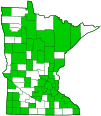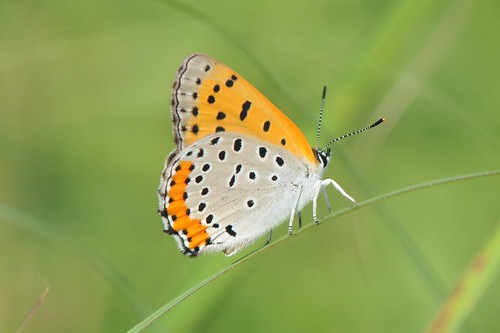Bronze Copper
(Lycaena hyllus)
Conservation • Description • Habitat • Ecology • Distribution • Taxonomy
Conservation Status |
|
|||||||
| IUCN Red List | not listed |
|||||||
| NatureServe | N4N5 - Apparently Secure to Secure S4S5 - Apparently Secure to Secure |
|||||||
| Minnesota | not listed |
|||||||
Description |
||
Bronze copper is a medium-sized butterfly but one of the larger coppers (subfamily Lycaeninae). It occurs in the northern half of the United States east of the Rocky Mountains, and in adjacent Canadian provinces. It is common in Minnesota. Adults have a wingspan of ⅞″ to 1½″ (23 to 38 mm). Males and females are similar in appearance except for the upper side of the forewing. On the male the upper side of the forewing is coppery-brown with a purplish iridescent sheen that gradually disappears as the individual ages. There are two dark spots in the forewing cell, a dark cell end bar, a narrow dark band on the outer margin, and a white fringe. Other spots on the forewing are faint, barely visible. On the female the upperside of the forewing is bright yellowish-orange. All of the spots are prominent, black, and bordered with brown. The dark band on the outer margin is much broader. The upper side of the hindwing on both the male and female is dark coppery-brown with a broad orange band on the outer margin, a row of round submarginal spots that fuse with a thin black line on the margin, and a white fringe. On both sexes the underside of the forewing is orange with black spots and a broad grayish-white band on the outer margin. The underside of the hindwing is the reverse, grayish-white with black spots and a broad orange band on the outer margin. |
||
Size |
||
Wingspan: ⅞″ to 1½″ (23 to 38 mm) |
||
Similar Species |
||
American Copper (Lycaena phlaeas) is smaller with a wingspan of no more than 1⅛″. The underside of the hindwing is darker and has much less orange. |
||
Habitat |
||
Open moist areas near water: meadows, marshes, bogs, ditches, edges of ponds |
||
Ecology |
||
Season |
||
Two broods: late June to late July and mid-August to early September |
||
Behavior |
||
|
||
Life Cycle |
||
The female lays eggs singly on the leaves of host plants. The eggs of the second brood overwinter and hatch in the spring. |
||
Larva Hosts |
||
Leaves of dock (Rumex spp.) and knotweed (Polygonum spp.) |
||
Adult Food |
||
Adults occasionally feed on nectar, including blackberry and red clover. |
||
Distribution |
||||
|
Sources |
|||
| 7/25/2022 | ||||
Occurrence |
||||
Common |
||||
Taxonomy |
|||
Order |
Lepidoptera (Butterflies and Moths) | ||
Superfamily |
Papilionoidea (Butterflies) | ||
Family |
Lycaenidae (Gossamer-winged Butterflies) | ||
Subfamily |
Lycaeninae (coppers) | ||
Genus |
Lycaena (copper butterflies) | ||
| Subgenus | Epidemia | ||
The taxonomy of the family Lycaenidae has long been disputed and continues to be the source of confusion. The two most common approaches to the classification can be termed “lumpers” and “splitters”. Lumpers classify all coppers in the single genus Lycaena, but divide the genus into several subgenera. Splitters raise many subgenera to the genus level and describe many new genera. According to lumpers, the differences between the proposed new genera are trivial, confusing, or nonexistent. Most splitters place Bronze Copper in the new genus Tharsalea. Many sources follow this classification, including iNaturalist. Most North American sources do not, including Integrated Taxonomic Information System (ITIS), Butterflies and Moths of North America (BAMONA), BugGuide.net, and Moth Photographers Group. |
|||
Synonyms |
|||
Hyllolycaena hyllus Lycaena thoe Papilio hyllus Tharsalea hyllus |
|||
Common Names |
|||
Bronze Copper |
|||
Visitor Photos |
|||||
Share your photo of this insect. |
|||||
| This button not working for you? Simply email us at info@MinnesotaSeasons.com. Attach one or more photos and, if you like, a caption. |
|||||
Greg Watson |
|||||
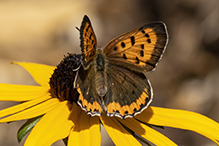 |
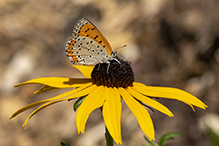 |
||||
Scott Leddy |
|||||
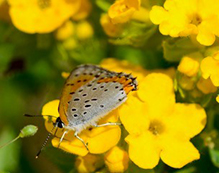 |
|||||
Lynn Rubey |
|||||
This tiny butterfly didn't stay still for very long but finally came close enough to get this photo as it seemed to like being in the tall grasses that provided more cover for it in The Big Stone National Wildlife Refuge between the West Pool and Pool 7. |
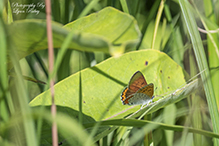 |
||||
A Bronze Copper Butterfly in the Big Stone National Wildlife Refuge it was fluttering among the tall grasses weaving in and out landing for a few moments on this blade of grass. |
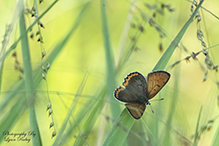 |
||||
A Bronze Copper Butterfly landing on a blade of grass near the edge of the road being careful with where I stood because my shadow would send it seeking deeper cover. |
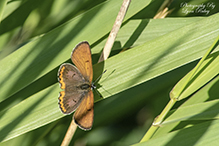 |
||||
MinnesotaSeasons.com Photos |
|||||
|
|||||

Visitor Videos |
|||
Share your video of this mammal. |
|||
| This button not working for you? Simply email us at info@MinnesotaSeasons.com. Attach a video, a YouTube link, or a cloud storage link. |
|||
Other Videos |
|||
| Bronzed copper butterfly and honeybee forage on Sullivants Milkweed, Marion County, Ohio, USA Robert Klips |
|||
About
Published on Jul 25, 2009 Sullivants milkweed (Asclepias sullivantii) is a prairie milkweed hat is uncommon in Ohio but extremely abundant at the Killdeer Plains Wildlife Area in Marion and Wyandot Counties. Although honeybees are overwhelmingly predominant floral visitors, every so often a butterfly comes to sip nectar from the flowers. Here is a bronzed copper (Lycaena hyllus). Note at the lower left, in and out of view, a 2nd honeybee is trapped, as one or more legs are caught in the slit that is the opening of the stigmatic chamber. |
|||


Created: 8/22/2019
Last Updated:
